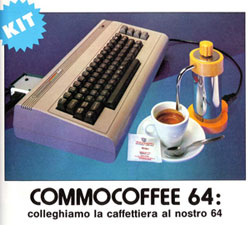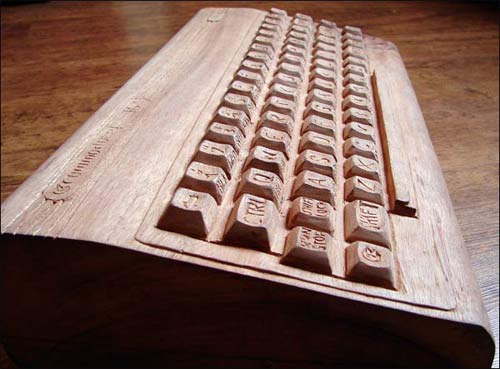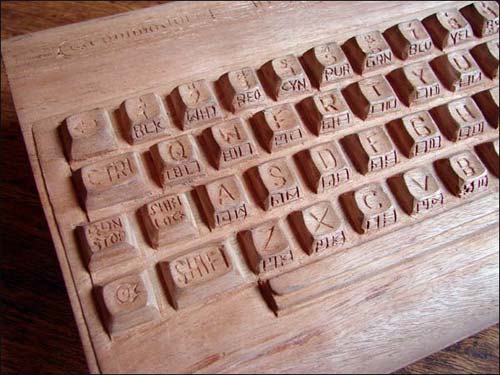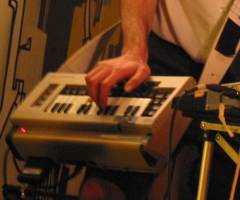The Null Device
Posts matching tags 'commodore 64'
2008/5/7
The head of the San Diego branch of the Republican Party has been revealed to be none other than the founder of videogame cracking ring Fairlight, who were responsible for a large proportion of the pirated Commodore 64 games in circulation. Tony Krvaric, was born in Sweden of Croatian parents but emigrated to the US in 1992 to escape the stifling constraints of social democracy, co-founded Fairlight in 1987, going by the handle "Strider". Even back then, Krvaric was known for his right-wing politics, and included the motto "Kill a commie for Mommy" in bragging screens on cracked titles he released.
2006/9/6
Investigations into the kidnapping of a 10-year-old Austrian girl who was kept in a hidden cell underneath a house have been complicated by the fact that the kidnapper stored all his files using a Commodore 64, which computer forensics teams are ill-equipped to deal with:
The beige-coloured machine was popular in the 1980s but is now considered an antique, though some electronic dance acts still use it and it has a cult following among some fans of retro computers.
There are emulators available which can make a modern PC capable of running Commodore 64 programmes but Maj Gen Lang said it would be difficult to transmit the data from Priklopil's machine to a modern computer "without loss".
2006/8/13
An enterprising hacker, noticing that his Nokia 6230i mobile phone has both an imaging sensor and Bluetooth, much like a wireless mouse, has written a Java applet that uses the phone as a mouse. It's not perfect (the imaging sensor is not designed for focussing so closely, so it needs a high-contrast surface), and currently requires a special custom driver on the computer, though he is working on making it behave like a standard Bluetooth mouse.
The hacker, going by the name of "Pyrofer", also has a number of other projects up, including a 1541-emulating memory card reader for the C64 DTV.
2006/7/6
You can do a lot of things with a Commodore 64. Some people make music with them. Meanwhile, in the mid-1980s, the Italians adapted this versatile workhorse of a computer to the task of making a cup of coffee:
From what I gather, the Commocoffee 64 was basically a coffee maker without a built-in timer, which could be plugged into the cartridge port of a C64, using the machine to do the timing. Which, of course, is not the most efficient use of a then expensive computer which could only do one thing at once, though that was probably not the point.
(via Boing Boing) ¶ 3
2006/6/29
Could this be the greatest ever prank played on a 419 scammer? The prankster, who received the usual proposition to help in the transfer of vast sums of money from Africa, posed as art dealer "Derek Trotter" and convinced the scammer or an accomplice to produce incredibly detailed wood carvings of a Creature Comforts figurine and a Commodore 64:


(via Boing Boing) ¶ 0
2006/4/18
The C64Music! blog has a detailed and quite interesting academic article on Commodore 64 game music, looking at it from technical, cultural, musicological and aesthetic perspectives:
One of the attractions to Commodore's games over those of its competitors was their unique musical aesthetic. With screaming guitar-like square wave solos, full-length songs, attempts to re-create traditional "rock band" line-ups in its use of tone channels, and its increased use of percussion, Commodore music was like rock to Nintendo's heavily looped disco aesthetic.
Martin Galway was the first to use sampled sounds on the C64, in the Arkanoid (Taito, 1987) theme song, as he explains: "I figured out how samples were played by hacking into someone else's code ... It was a drum synthesizer package called Digidrums, ... I couldn't really figure out where they got the sample data, just that they were wiggling the volume register, so I tried to make up my own drum sample sounds in realtime—which is the flatulence stuff that shipped in Arkanoid."
(The hand-coded digi-flatulence technique pioneered by Galway became a standard part of SID composition, to the point where the reFX QuadraSID (a software synthesiser based on the SID chip) has a built-in "Galway Noise" setting, where those with the desire to do so can enter a list of hex values which will be fed into the SID chip's registers in the appropriate fashion. It comes with preset Galway Noise values, which are triggered by MIDI channel 10, though don't sound particularly like a useful drum kit.)
The article goes on to mention that many C64 games used melodies lifted from existing pieces of music, both classical and pop (with scant regard for credit, let alone copyright), the use of looping on various levels, the use of generative music techniques to avoid repetition, the (somewhat limited) influence of the Nintendo game-music aesthetic on C64 game music, and interactive aspects of game music, such as phrases triggered on entering/leaving rooms.
Tetris (Mirrorsoft, 1987), for instance, was very different than the versions released on the NES, showing this very different aesthetic particular to the C64. Not having any selectable music (which was an option on the NES), Wally Beben composed all original music—one very long (about 26 minutes—13Kb) track of many segments. In order to save space (likely), certain micro and mesoloops of the track repeat: for instance the bass/percussion line that begins the song repeats just one bar for about half the track, with different melodies coming over top and being layered with various accompaniments. This accumulative form—the gradual building up of a groove by adding sequential units cumulatively (Spicer, 2004)—was closer to the electronic trance music beginning to emerge in the late 1980s than any game music aesthetic of the time.
2006/1/21
This site lets you play old Commodore 64 games in your browser, without downloading any software. (Assuming your browser has Java and is on a reasonably fast machine, of course.) The experience includes everything, from SID chip sound to cracker-group intro screens, though your frame rate may vary (it feels roughly like C64 emulation on a 486-class machine in the mid-90s). A new game is added every day; today's addition is Giana Sisters, a Mario Brothers knockoff with added 1980s hairspray.
2006/1/15
My most recent softsynth discovery is QuadraSID; this is a VST/AU softsynth which emulates, as the name suggests, 4 SID chips (and emulates them quite thoroughly, down to letting you choose the chip model and whether you want bugs to be emulated accurately or fixed), along with enhancements such as external envelopes, arpeggios and a mini-sequencer. It comes with a batch of presets designed by Commodore 64 game composer Chris Hülsbeck (perhaps best known for the Giana Sisters score), and now there is an additional sound bank by Rob Hubbard, which is full of fuzzy, warbly SID goodness. Of course, it's not limited to C64 game-music homages; a stack of SIDs can have its uses, from Broadcast-style lo-fi to fat pads.
The company which makes quadraSID also has some other interesting products, such as Slayer2, a guitar synthesiser based on physical modelling, along with amp and pedal models; it sounds almost like the real thing; not quite as authentic as sample-based systems, though a lot more flexible. The fact that it can turn randomly pressing keys into an over-the-top finger-shredding cock-rock guitar solo of the gods is impressive enough in its own right. (If I ever end up revamping a certain track from my last year's NaSoAlMo album, I may have to invest in a copy of this).
There's also this one, which seems to be optimised for goa-trance and euro-cheese, and makes making such music ridiculously easy, as well as this somewhat Casio CZ-101-ish unit.
2005/9/29
A streaming radio outfit named Flat Four has a series of 3 programmes about 1980s home computer music. I just listened to the Commodore 64 one, and it's pretty interesting. It has interviews with various game-music composers (including Rob Hubbard and Benn Daglish, who now participates in the chiptune-party scene), fragments of the original music and various reworkings thereof (from club/dance remixes to heavy metal and acappella vocal covers), and some examples of new music made using Commodore 64s.
2005/9/9
I just found out that there is an entire blog devoted to Commodore 64 music; and it seems to be surprisingly busy too. Some of the things on it include C64 music nights (and there's one in Manchester this weekend; had I known about it sooner...), new music software which manages to squeeze ever more out of the C64 hardware, homebrewed MIDI interfaces, C64s grotesquely hacked into rack-mounted synths, instructions on making one's own cartridges, ways of using quirks of the C64 hardware to make sound, people selling C64 game ringtones, and links to creative projects like Casionova, an 8-bit Kraftwerk covers compilation and more.
Not to mention a Commodore-branded entry onto the media player market, which doesn't actually play C64 software or chiptunes. You'd think that whoever owns the brand would have done more than commissioning a generic media player and slapping the chickenhead logo onto it. I wonder if it's of any better quality than the "Commodore" DVD+Rs I bought last year, which burned perfectly well but failed to read afterward.
(via MusicThing) ¶ 0
2005/5/13
Not that long ago, a joystick-shaped device named the C64 DTV, containing a Commodore 64-compatible computer (developed by Jeri Ellsworth, who also created the C-One super-C64) and 30 games, appeared on the market. Hackers who bought these are now opening them up and adding things to them; for one, it is possible solder on a PS2 keyboard (unlike the original C64, this one speaks the PS2 keyboard protocol) and, indeed, a standard Commodore serial bus connector for plugging in a drive (photos here); alternatively, one can embed a DTV inside a working Commodore floppy drive. With a keyboard and storage, the diminutive box (costing US$20, or about 3 times as much in the UK) becomes a fully usable Commodore 64, except for a few additional augmentations, such as a video chip capable of 256 colours. And there is more information on undocumented features of the DTV here.
2005/3/1
![]() My latest gift to the world's collection of marginally useful software: x64spriterip, a quick and dirty Python script which pulls sprite images out of Commodore 64 emulator memory dumps and writes them to PGM files. Just in case you ever felt like grabbing some graphics from your favourite childhood computer game for a chat-room avatar or T-shirt logo or somesuch but couldn't be arsed writing the software to do it yourself.
My latest gift to the world's collection of marginally useful software: x64spriterip, a quick and dirty Python script which pulls sprite images out of Commodore 64 emulator memory dumps and writes them to PGM files. Just in case you ever felt like grabbing some graphics from your favourite childhood computer game for a chat-room avatar or T-shirt logo or somesuch but couldn't be arsed writing the software to do it yourself.
2004/12/20
The Commodore 64 music software industry is alive and well; at least as much so as the GameBoy and Nintendo Famicom music software industries, anyway. Some intrepid hackers have created new music software for the Commodore 64; Prophet 64 is available in 3 flavours: standard, TB (which behaves like a Roland TB-303, or as much as one as the SID chip will do), and TR (which behaves like a TR-909, only with Rob Hubbard-style drum samples, as heard in much video-game music). Prophet 64 is free software, and will run happily on a 64 emulator, though with a real 64 it can be controlled with game paddles and synced to MIDI devices (with a simple add-on interface). To facilitate getting it onto a 64, it's available as a disk image, or as a WAV file to record to cassette for loading. (via MusicThing)
2004/7/30
 I finally got around to seeing CasioNova, a local musician who plays songs on 80s Casiotone keyboards, 8-bit computers and such. He played at the Kent St. Café in Smith St., getting up on stage attired in white shirt, knee-length pants and knee-high socks, and proceeding to sing and play a number of pop ditties and throw shapes as he played his keyboards. The kit he used consisted of a bunch of Casiotone and Yamaha home keyboards, as well as a Commodore 64 with the Music Machine cartridge and keyboard overlay, and, at one stage, a GameBoy.
I finally got around to seeing CasioNova, a local musician who plays songs on 80s Casiotone keyboards, 8-bit computers and such. He played at the Kent St. Café in Smith St., getting up on stage attired in white shirt, knee-length pants and knee-high socks, and proceeding to sing and play a number of pop ditties and throw shapes as he played his keyboards. The kit he used consisted of a bunch of Casiotone and Yamaha home keyboards, as well as a Commodore 64 with the Music Machine cartridge and keyboard overlay, and, at one stage, a GameBoy.
 So what was the music like? Somewhere between electropop and outsider music. Parts of it were a bit like electroclash, only without the distressed denim and designer trucker caps, perhaps sounding like The Emergency with lyrics, or a more 1980s-retro Talkshow Boy. There was a definite geeky quality to it; you could tell that this is someone who would rather stay at home and tinker with his gadgets than do cocaine with the coolsies on Chapel St. There was something sincere, improvised and passionately unhip in CasioNova's act, and that's a good thing.
So what was the music like? Somewhere between electropop and outsider music. Parts of it were a bit like electroclash, only without the distressed denim and designer trucker caps, perhaps sounding like The Emergency with lyrics, or a more 1980s-retro Talkshow Boy. There was a definite geeky quality to it; you could tell that this is someone who would rather stay at home and tinker with his gadgets than do cocaine with the coolsies on Chapel St. There was something sincere, improvised and passionately unhip in CasioNova's act, and that's a good thing.
CasioNova's going to an electronic art conference in Helsinki soon (and is raising funds to do so); he announced that he has made a pact to not return if John Howard wins the next election, and if he doesn't get a girlfriend. Before he leaves, he is playing again next week, at the Pink Spunk electro night at Loop, along with some folks named Mink Engine.

2004/7/29
There are now quite a few emulators running on PalmOS devices; from an expensive commercial Atari 2600 emulator to a lot of Sinclair Spectra to the Frodo C64 emulator. This actually runs quite well on my Tungsten T3 (with the slight exception of Paradroid going into pause mode every time one pushes the joystick down). I remember real Commodore 64s, and, some time after that, the hard-won satisfaction of seeing PCs (486s or low-end Pentiums, I think) finally get fast enough to emulate C64s well enough for games at full speed (possibly without sound, though); to think that now you can run a nigh-perfect C64 emulation on a pocket organiser is, well, strange.
Elsewhere, there was a project to port MAME to PalmOS, and someone collecting donations for it. The donations page seems to have disappeared, though, and the MAME site has no links to it. Hopefully someone will pull it off sometime soon. (There is Xcade, a commercial arcade emulator, though this only supports a handful of ROMs.)
2003/10/6
Commodore 64 emulation for Nokia futurephones. It appears to use the Frodo emulator for Symbian or EPOC or whatever it calls itself. I've run a version of this on a Psion I picked up a while back, and it wasn't very usable, though that's because of the monochrome screen. (via bOING bOING)
2003/7/16
More on the Tulip/Commodore 64 thing: they're pretty much ruling out taking down non-profit sites, threatening open-source emulators or doing anything else to piss off the fan community (and quite wisely). Oh, and they're the mob who tried to sell a 486 Windows PC with a C64 emulator as the "new Commodore 64" a few years ago. (Which sounds like a daft idea, but is it any more so than marketing a new designer luxury car as a "VW Beetle" or "Cooper Mini"?)
2003/7/14
Dutch PC manufacturer buys the Commodore 64 trademark, makes ominous noises about "not allowing unauthorised use of the brand" and releasing an emulator, the only licensed official one. Does this mean takedown notices for VICE, the C-One and the funet.fi CBM archive, or just that they'll go after the people selling Commodore 64 T-shirts at Camden Market? (via Slashdot)
2003/3/11
Contiki, a modern multitasking OS/GUI/web browser which runs on an unmodified Commodore 64 (and doesn't need any helper software on another machine either). And they've ported it to a number of other 8-bit platforms, such as the Nintendo Entertainment System, the Apple ][ and the VIC-20. (Wait a minute, VIC-20???) (via Slashdot)
2003/2/3
Following a few links from the C-One Commodore 64-of-the-future project, I discovered that it is by no means the only such project, and merely the tip of the iceberg. There is an entire subculture of people (mostly in northern and central Europe, it seems) hacking Commodore 64s to do things they were never meant to, and developing all sorts of odd artefacts; such as The SuperCPU, which appears to be a 20MHz replacement CPU for the C64 with extra PC-style RAM; people are writing demos, games (and modifications to cracked commercial games) and even operating systems for it. And you can top it all off with an IDE interface which plugs into your C64's cartridge slot.
2003/2/2
The Commodore 64 is coming back to conquer the world. Meet the C-One, a Commodore 64 for the new millennium. And this is not some crappy 486 Windows PC with a 64 emulator bundled; this is an ATX motherboard with 65C816 CPU (that's the 16-bit 6502-derivative used in the Apple IIgs), reengineered VIC/SID-compatible chips with enhanced capabilities (sprites can be up to 256x256, and the MonsterSID chip has 8-bit sample playback; perfect for retro-styled electronica). It will come with 32Mb of RAM (that's the equivalent of 512 C64s), IDE and PCI interfaces, a CompactFlash slot for mass storage (I wonder if they'll make it look like a really big 1541?), as well as a C64 cartridge slot and disk drive/printer serial connector, and a BeBox-style "geek port" to plug your homemade robots/model train set/whatever into. No Datasette port though, so you'll have to import your old tapes some other way. The motherboard appears to be for sale here, costing €249 (about A$400, I think). (via Slashdot)
(Mind you, this will probably be less compatible than a software-based C64 emulator, because I doubt that the 65C816 supports the "undocumented" 6510 opcodes that some games/demos use in their mad rush for optimisation. And I wonder how they got memory banks (another custom feature of the 6510) working.)
But wait, there's more; according to this Slashdot comment, the basic design could easily be modified (by changing the CPU and glue logic) to be not just a C64 for the new millennium, but a new, improved VIC-20, or the most arse-kicking Atari 2600 ever built; or as a basis for developing your own bizarre Frankensteinian computer experiments.
The C-One aims at those who are into computer nostalgia, as well as those who want it for educational purpose. We'll supply all kinds of material for you to start VHDL programming, and instantly try it out on this board. Start modifying the board without soldering, extend the capabilities of your video output, or even switch to a completely different computer on the fly.
Update: Another page containing a lot of technical details of the C-One. Apparently (a) it's all done with FPGA chips, and people are already writing operating systems for it. (Check out the screenshots of that one; it looks like a cross between Windows 95, Commodore 64 GEOS and one of the weird, quasi-Mac-inspired GUIs that existed a decade ego.)
2003/1/7
Yow! Not one, but two open-source remakes of the old Commodore 64 game Paradroid. Freedroid looks like the more, umm, interesting attempt, extending the game into a multi-player RPG. Now let's see someone do a remake of Wizball. (via the retro gaming issue of "Edge", which appears to be an English video-game mag.)
2002/7/16
Geeky distraction of the day: A big list of Commodore emulator-related file formats. Interesting that they've now got digitised C64 tapes, consisting of the data as the C64 would see it; essential for that authentic watching-the-flashing-border-until-it-loads experience that ordinary emulator formats don't give you. Not to mention raw GCR disk images, for those who missed hacking the 1541 and inventing better ways of writing bit patterns to a 5 1/4-inch floppy. That's what plentiful RAM, disk space and CPU cycles give you, I suppose. I wonder how long until someone writes an 8-bit computer emulator which works on the logic-gate level, or renders the actual electrons in the machine?
2002/3/4
A few days ago, I dreamt that I saw a new Commodore 64. It was like the old one (well, the white, triangular one, anyway), but for one addition: beneath the joystick ports, there was a USB socket. Apparently there was logic onboard which translated USB mass storage to the Commodore's crippled IEEE-488, allowing the C64 to access ZIP disks and the like as if they were 1541 disks. Then I realised that the USB translator logic would probably be more complex and computationally powerful than the C64 itself.
And, as if by coincidence, NtK tells me that some enthusiastic soul is reviving Zzap!64 Magazine, undoubtedly reliving cherished childhood fantasies. Don't expect to see issue 107 at newsstands anytime soon, though if you have a fast link and a colour printer, you can print out yourself and show it to your trainspotter mates. (It's only 30Mb in PDF format.) And if that's not enough, they have an archive of back-issues, in HTML and scans; this includes a number of features, including Andrew Braybrook's Paradroid diary.
I wasn't a Zzap! reader during the 80s; I preferred Commodore Computing International, which had a bit more in the way of technical details. Now I just read Future Music, which fills a similar niche, though is perhaps a bit less silly. What is it about English tech magazines?
2000/7/10
For those of you who like to know that a Commodore 64 was butchered to make your new synth module, those wacky Swedish funsters who made the SidStation have a new limited edition model, the SidStation Ninja, with "a special set of martial arts patches originating from the domains of chaos". (Wonder how long until someone makes a virtual Commodore 64 synth, based on a fast RISC CPU running a SID emulator...)